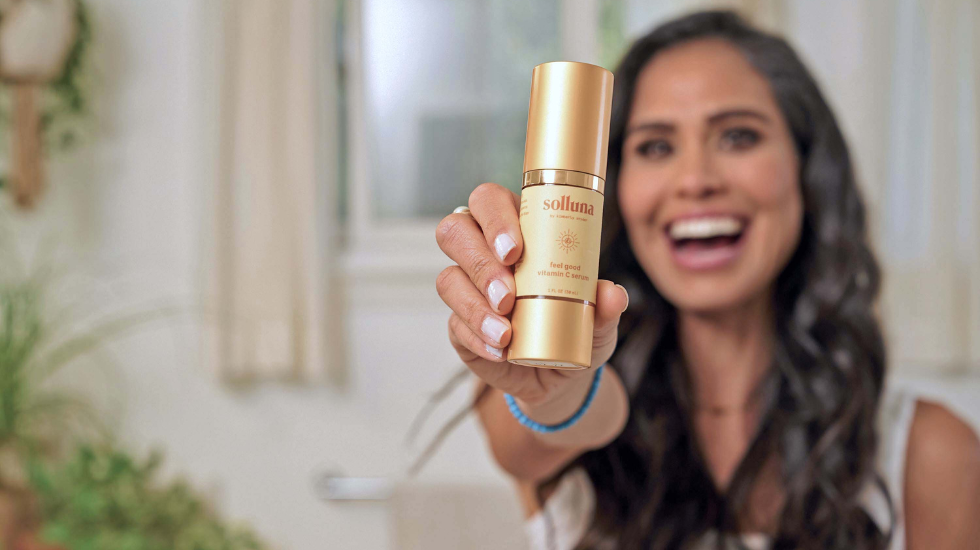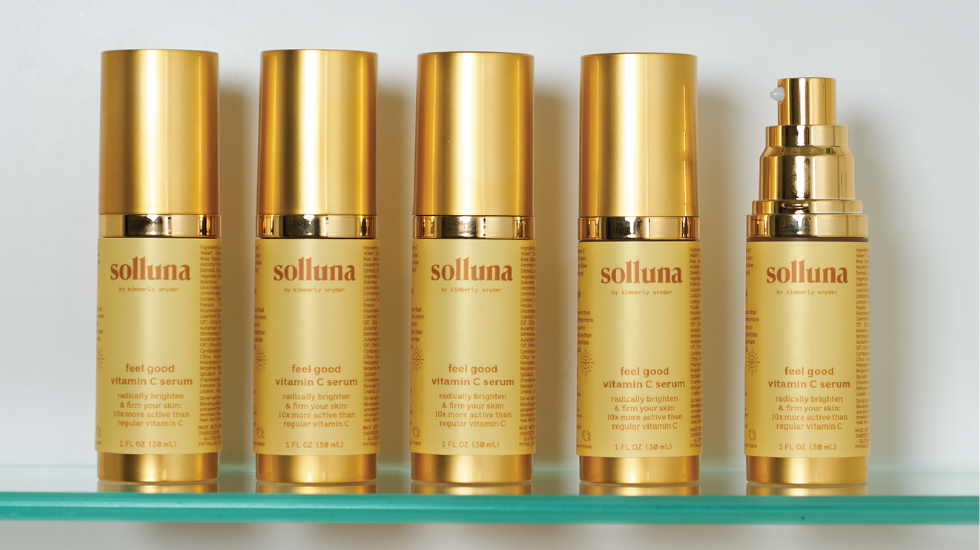
Vitamin C serums are one of many skincare products on the market that make big promises for healthy and youthful skin, but they often come with a lot of questions, like how or when to use Vitamin C serum for the best results? It can be a lot to think about when all you want is to brighten your skin.
When it comes to skincare, I absolutely think that it’s worth doing some extra research! It’s a personal passion of mine, and I definitely think that when it comes to your body’s largest organ, taking care of it in a natural and holistic way is key to healthy, glowing skin.
Popular skincare products like all the serums, lotions and creams you see at the make-up counter tend to be full of chemicals, fragrances and preservatives that can actually damage your skin!
So when it comes to your skincare, less is definitely more! The fewer products you use and the fewer chemicals in those products, the more beautiful and vibrant your skin will be.
It all comes down to finding the right product with the right chemical makeup. 🙂
One product that is an important staple of my skincare routine is a good Vitamin C serum. And like with anything health and beauty related nowadays, there is a lot of information about it online, and not all of it is helpful! That’s why I’m excited to share this handy guide to finding the right Vitamin C serum and how to use it to guarantee smooth, youthful skin.
What Are The Benefits? How Does Vitamin C Help My Skin?
I think we all know by now that Vitamin C is good for us, but there’s more to Vitamin C than what you get in a glass of orange juice!
Vitamin C, also known as ascorbic acid, is a water-soluble vitamin that is vital for good health. Water-soluble means that these vitamins are eliminated from your body much faster and need to be replenished more often.
Vitamin C is vital to your overall health. Here are just a few ways that Vitamin C helps keep you healthy:
- Vitamin C is the key to preventing terrible diseases like scurvy, which is why sailors stocked up on so much citrus on long voyages.
- It’s vital for treating and preventing illness, controlling infections, and healing wounds.
- Vitamin C is a powerful antioxidant that helps protect your body from free radicals that can make you sick and age faster.
- Vitamin C supports your body’s immune system, which is why megadosing Vitamin C is so popular for preventing or recovering from illness. [1]
If I had to pick a favorite vitamin, it would absolutely be Vitamin C because of its health-boosting properties. Vitamin C can also help your body absorb iron better and help your body regenerate its vitamin E. It’s also super important in managing oxidative stress and preventing signs of aging.
Vitamin C is also an important component for making collagen, which is not only vital for supple, youthful skin, but also healthy joints.
Vitamin C’s Effect on Collagen
Vitamin C’s antioxidant properties and beneficial effects on collagen can make it a powerful dermatology treatment. More research is needed to discover the full effect of topical Vitamin C as a skin treatment, but initial studies so far are promising!
Preliminary research has found that not only is Vitamin C helpful in boosting collagen production and maintaining your skin’s natural elasticity, but treating certain skin conditions as well. In particular, topical Vitamin C can be helpful in preventing signs of aging, treating hyperpigmentation (dark spots or uneven skin tone), and tissue inflammation. It can also help damaged skin tissue heal. [2]
These benefits are enhanced by Vitamin C’s amazing safety profile, so you know it won’t damage your skin like retinol or other skincare solutions.
One of the only downsides right now with topical Vitamin C is that it is difficult to penetrate your skin barrier and introduce the right dosage to your dermis— the second layer in your skin— because it’s less stable than other forms of Vitamin C. (Its chemical makeup changes when exposed to UV light.)
Luckily, creams and serums with the Vitamin C derivative Magnesium ascorbyl phosphate (Asc2P) can penetrate deep into your skin to maximize skin protection and collagen production.
With an endless supply of Vitamin C serums on the market, how do you know how to find the right one for you?
Related: 5 Essential Vitamins For Overall Wellness!

What Kind of Vitamin C Serum Should I Look For?
The best Vitamin C serum to use would be one that uses natural, plant-based products and doesn’t contain any chemicals that can damage your skin, which can actually increase the signs of aging!
You also want to ensure that your Vitamin C serum contains Asc2P so the serum is able to get deep enough to make a difference.
My Feel Good Asc2P Vitamin C Serum is a potent, gentle serum that brightens up dull skin, boosts collagen production, and repairs your skin, helping it stay youthful and vibrant. My formula is vegan, gluten-free, and free from parabens and phthalates that you do not want on your skin! It’s also perfect for every skin type, whether you have “normal” skin, sensitive skin, dry skin, or any kind of skin! 🙂
So whether you’re fighting those pesky fine lines or just want to maintain your beautiful look, you want to choose a Vitamin C product that delivers everything your skin needs and avoid the toxic chemicals that dry out your skin.
How Do I Apply Vitamin C Serum?
You might be thinking, “don’t I just put it on like any other serum or lotion?” That couldn’t be further from the truth, Beauty! How you apply your Vitamin C serum is just as important as when you apply it. But once you have your routine down, you’ll be amazed at how amazing your skin looks!
- First, you should only apply Vitamin C serum on a clean face. This ensures that your face is free of any excess oil that can prevent your skin from absorbing the serum. For a beautifully clean face, I recommend using an all-natural cleanser like my Feel Good Cleanser, which deeply cleans your skin while nourishing and soothing your skin.
- A little Vitamin C serum goes a long way— you only need 1-2 pumps of the serum for each application. Allow the serum to absorb fully into your skin before applying additional products.
- Always apply your moisturizer after you apply your Vitamin C serum.
- Apply your eye cream after you apply moisturizer.
- If you apply your serum in the morning or during the day, apply sunscreen after eye cream— especially if you’ll be spending time outside.
- You can apply any desired makeup after you let your sunscreen fully set or dry.
When Should You Apply Vitamin C Serum?
This is one of the most important things to know about Vitamin C serum! When you use it can make a huge difference in how well it works in protecting and beautifying your skin.
A lot of places recommend applying your Vitamin C serum in the morning so it can better protect your skin against unhealthy UV light and free radicals. If you don’t have overly sensitive skin, and perhaps wear a natural, mineral sunscreen on top, you can apply your Vitamin C serum in the morning, as I do. However, it is always recommended to apply Vitamin C serum at night, during your nighttime routine. This can help your skin recover from the day’s events and fortify itself for the next.
How Often Should You Apply Vitamin C Serum?
For best results, you should use Vitamin C serum daily, every single night and also during the day if your skin isn’t overly sensitive.

Want a Healthy, Sun-Kissed Glow? Add Vitamin C Serum to Your Beauty Routine!
The products you use in your skincare routine can be the difference between bright, youthful skin and skin that looks dull, sun-damaged, and weathered.
For brighter, more resilient skin, you can’t go wrong with using a Vitamin C serum. Vitamin C is a vital component of a healthy body, a healthy immune system, and healthy, glowing skin. Remember, less is more with your skin care products! Make sure your chosen products are free from any extra chemicals that can reduce their effectiveness or even damage your skin!
Your skin is your body’s largest organ, and it’s so important to take the best care of it possible. 🙂
With much love,

Citations
- “Vitamin C.” Harvard T.H. Chan School of Public Health, Harvard University, www.hsph.harvard.edu/nutritionsource/vitamin-c/.
- Telang, Pumori Saokar. “Vitamin C in Dermatology.” U.S. National Library of Medicine, Indian Dermatology Online Journal, Apr. 2013, www.ncbi.nlm.nih.gov/pmc/articles/PMC3673383/.
The post When to Use Vitamin C Serum: Your Guide To Healthier Skin appeared first on Solluna by Kimberly Snyder.
No comments:
Post a Comment